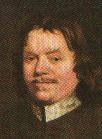Heroes of the Faith
Concise stories of significant Christian leaders
Concise stories of significant Christian leaders

 John Bunyan
John Bunyan1628-
————————————————————————
John Bunyan was born in Elstow, near Bedford, into a poor home. He probably acquired his grasp of the English language from reading the Bible. As a youth he was involved in the Civil War on the Roundhead side.
In 1649 he married, and his wife brought him Dent's Plain Man's Pathway to Heaven and Bayly's Practice of Piety. His real religious crisis, described in Grace Abounding, began in the 1650's, when he was working as a tinker.
In 1653 he joined Pastor Gifford's Independent church in Bedford and felt called to the lay ministry. A year or two later he began to preach with some success. In 1660, with the restoration of Charles II, he was arrested by a zealous magistrate and spend twelve years in jail for refusing to stop preaching. His imprisonment enabled him to produce his masterpiece The Pilgrim's Progress and other writings, including some verse.
Shortly before his release in 1672 (his imprisonment was not continuously severe) Bunyan was called to be pastor of the nonconformist Bedford church. From that date most of his time was spent in preaching and evangelism in the Bedford area.
Bunyan is best known for three works: The Pilgrim's Progress (1678, 1684), The Holy War (1682) and Grace Abounding to the Chief of Sinners (1666). His well-known hymn, "Who would true valour see", is found in The Pilgrim's Progress.
He proved to be a master of simple, homely English style, narrative and allegory. The Pilgrim's Progress has continued to be a best-seller down to the present day.
Bunyan had been writing, mostly sermon treatises and poems, for about twenty years when the first part of his masterpiece appeared in 1678. Immediately it was clear to him and to his audience that he had found something special, an allegory of the Christian life that included the Reformation emphases on justification by faith and the Bible's availability to all, yet which had the vigour and immediacy of the folk tale. He has constructed a distinctively Christian heroism that is vulnerable, prone to mistakes, and yet ultimately victorious through grace.